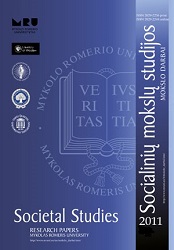Tapatybės vagystės elektroninėje erdvėje kriminalizavimas: lyginamieji aspektai
Criminalization of Online Identity Theft: Comparative Aspects
Author(s): Darius Štitilis, Paulius Pakutinskas, Inga Dauparaitė, Marius LaurinaitisSubject(s): Criminal Law, Criminology, Social Informatics, Comparative Law
Published by: Mykolas Romeris University
Keywords: online identity theft; criminalization;
Summary/Abstract: The authors of the present article analyze the criminal legislation of eight foreign countries (the United States, the United Kingdom, Nigeria, France, Finland, Estonia, Russia, China) as well as Lithuania in order to discuss and compare the criminalization aspects of online identity theft. Online identity theft is a rather new phenomenon and dangerous not only to separate individuals but to the whole society. It is concerned with the violation of consumer protection rules, security and privacy and anti-spam rules, etc. Online identity theft is a global problem, and this leads to the discussions whether it should be criminalized or not. The analysis is focused on the Three-Phase Model of online identity theft: obtaining identity-related information (phase 1), interaction with identity-related information (phase 2) and the use of the identity-related information in relation to a criminal offence (phase 3). The authors analyze whether in the countries under investigation online identity theft is treated as a criminal act or separate phases of it are considered as constituent elements of common crimes such as unlawful access to data, fraud, forgery, etc. only. The authors present a more comprehensive analysis of two countries—the United States and Nigeria. The choice is based on the fact that the United States has a great experience of fighting cyber crimes and, as research has shown, is the only country where online identity theft is criminalized. While the situation in Nigeria is taken for an in-depth consideration because of its Criminal Code Act having a separate chapter in which personation is criminalized. Also, in this article, summarized information about other analyzed countries is presented, the differences of the existing criminal legislation are described and the variety of sanctions for online identity theft phases is discussed. However, the research has shown that the penalties imposed for online identity thefts (or its separate phases) are mostly fines or imprisonment. In this article, it is emphasized that online identity theft is not criminalized (except the United States), and this impedes the detection, investigation and prosecution of such conduct at both domestic and international levels. Therefore, the authors are going to bring online identity criminalization up for discussion on the basis of the research presented in this article.
Journal: Socialinių mokslų studijos
- Issue Year: 3/2011
- Issue No: 1
- Page Range: 153-171
- Page Count: 19
- Language: Lithuanian

